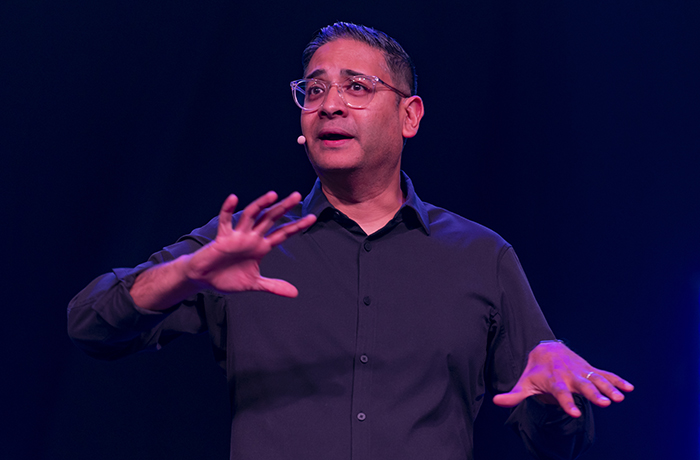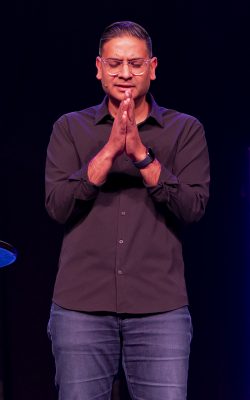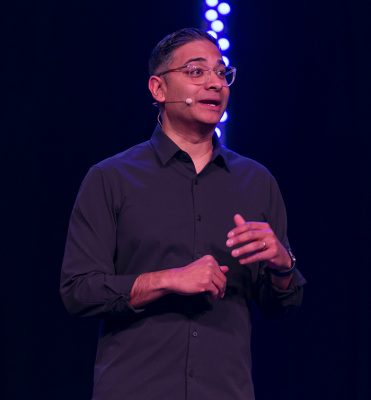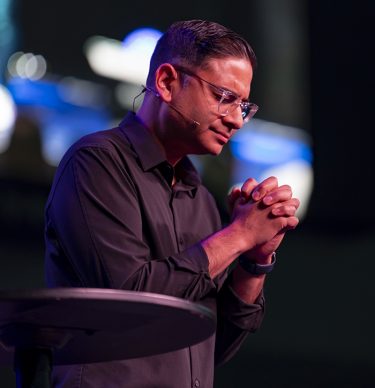
Story by Rick Vacek
Photos by Mathew McGraw
GCU News Bureau
“I’ll pray for you.”
Some people find it reassuring. They feel solace from the power of prayer – their own, someone else’s, doesn’t matter.
Others find it patronizing. They’d prefer that you do something more tangible, such as bring them food or spend time with them.

Glenn Packiam didn’t reference that dichotomy of reactions to prayer Monday morning in his first Chapel talk at Grand Canyon University. Instead, he wanted to teach his GCU Arena audience about something that can’t be debated – prayer’s place in our relationship with God.
The Associate Senior Pastor of New Life Church in Colorado Springs, Colorado, told the story of a man who fell off a cargo ship off the coast of New Zealand in the middle of the night and was saved by an abandoned buoy. It’s not unlike what people have experienced during the troubles of the last two years.
A lot of us have been looking for the buoy or, if we found it, clinging to it, Packiam suggested.
“I think in many ways – actually, in a very real way — the thing that we’re all clinging to is to Jesus Himself,” he said. “The One that we’re clinging to, the One that we’re hanging on to in the midst of the turbulence and the waves and the turmoil – we know that if it isn’t Jesus, we at least know somewhere inside that it should be. But the question, oftentimes, is how.”
The answer is prayer. It’s not just extra credit or peripheral.
Prayer, Packiam said, is “the very means by which we cling to God Himself … your essential life support. The only way that you’ll survive in this ocean is by this lifeline to God.”
He devoted the rest of his talk to showing how Psalm 13 demonstrates the three types of prayer: protest, petition and praise.
Psalm 13:1-2 outlines protest:
How long, O Lord? Will You forget me forever?
How long will You hide Your face from me?
How long must I take counsel in my soul
and have sorrow in my heart all day?
How long shall my enemy be exalted over me?

“I find that actually this is the kind of prayer that we want to pray but don’t know that we can,” Packiam said. “This is the kind of prayer that comes from the gut, from the depths of our being, but we’re not sure because it’s not ‘church-y’ prayers.”
If someone bellowed “But why, God?” at a Sunday service, he added, it probably would be considered awkward.
And yet Scripture is filled with prayers of protest.
“The psalms are the prayer book of the people of God, and not just for the people of God in the Old Testament. … Christians, for 2,000 years, have been praying the psalms,” he said, adding that the early Christians considered the psalms “like a gymnasium for the soul. They’re how you work out your spiritual life.”
When we hear of hospitals being bombed in a war zone and other suffering and pain, he said, prayers of protest allow us to call evil for what it is – evil.
“It bears witness to a greater reality,” he said. “It’s saying, ‘God, You didn’t make the world to be like this.’”
Packiam compared it to having a frustrating experience with customer service and asking to speak to the manager. Protest prayer takes our complaint to the highest level, he said, rather than wasting our time complaining to our peers and simply getting cynical.
His closing thought about this:
“The language of protest teaches us to say, ‘It should not be this way.’”
The next two verses of Psalm 13 illuminate the prayer of petition:

Consider and answer me, O Lord my God,
Light up my eyes, lest I sleep the sleep of death,
lest my enemy say, “I have prevailed over him,”
lest my foes rejoice because I am shaken.
Packiam told two humorous stories of how his children have boldly approached him, even when he is preaching. We should do the same with God, he suggested, just as a roomful of babies should be filled with cries, not silence.
“If you’ve stopped praying this year,” he said, “maybe it’s because you’ve stopped believing that God actually cares.”
The prayer of petition, he added, teaches us to say, “Come and make a way.”
Finally, there’s praise, spelled out in verses 5 and 6 of Psalm 13:
But I have trusted in Your steadfast love;
my heart shall rejoice in Your salvation.
I will sing to the Lord,
because He has dealt bountifully with me.
It’s the same idea as enjoying something and wanting to share it, Packiam noted, citing a quote from C.S. Lewis: “Praise is the completion of joy.”
And that praise requires faith.

“Lord willing, you’re going to have a lot of years ahead of you,” he told the students. “But what you’re developing right now is you’re developing a history with God.
“And one day five years from now, 10 years from now, 15 years from now, 20 years from now, you’ll be looking back and you’ll say, ‘Gosh, this moment is not good, but God has been good in my life before.’”
The Bible, Packiam said, shows who God is by what He has done – most significantly, by suffering and dying on a cross.
“Your life does not end with suffering and death. Your life ends with resurrection,” he said. “The end of your story will be resurrection and new creation. With God as the author and the finisher, your story has a good beginning and a glorious ending. And that’s why Psalm 13 may have started with protest, but it ends with praise.”
In other words, he added, heaven isn’t a place for prayers of protest or petition – only praise.
“It teaches us to say, ‘It will not always be this way.’”
Contact Rick Vacek at (602) 639-8203 or [email protected].
****
- To watch the full Chapel service, including the music of the Worship team, the announcements for the week and Glenn Packiam’s talk, click here.
- Next Monday’s speaker: Erik Nelsen, GCU Director of Spiritual Life
****
Related content:
GCU Today: Guckenberger's Chapel message packs a punch
GCU Today: Alcorn is well-versed in God's multiplying mercy
GCU Today: Let Holy Spirit light the way, Griffin tells Chapel
GCU Today: Kruckenberg gets to the heart of a touchy subject



































































